|
Mormon Prophet
Gordon B. Hinckley blew some easy opportunities to shine
as a true leader, let alone as a real prophet.
Here's some examples of what President Hinckley could have
said, compared to what he actually did say:
1. On the Invasion of Afghanistan
In speaking on the start of the war in Afghanistan in October
2001, as a real prophet, Hinckley would have said:
"Now we are at war. Great forces have been mobilized and
will continue to be. Political alliances are being forged.
The Lord has assured me that America will soon vanquish
the Taliban from Afganistan. The Lord has told me that this
conflict will not adversely affect the progress of the church,
but that we are to help in relieving the suffering of the
Afghani people as much as possible."
"I testify that the Lord is aware of our times and is watching
over this people. He expects us to be a beacon of charity
in service to those who suffer from oppression. I am optimistic.
I know the Lord will provide for the true needs of the church,
even if some of you may struggle with paying a full tithe
for a season. The Lord understands. He is forgiving."
"Now, brothers and sisters, we must do our duty, especially
as citizens of this great nation. The Lord has warned me
that some may use this time of crisis in order to limit
civil liberties. Peace may be denied for a season, but as
members of the church, and as responsible citizens, we must
be vigilant in upholding our liberties and defending the
great principles of the constitution. At this time may we
all follow the righteous example of Captain Moroni in the
Book of Mormon, of which was written: "And Moroni was a
strong and a mighty man; he was a man of a perfect understanding;
yea, a man that did not delight in bloodshed; a man whose
soul did joy in the liberty and the freedom of his country,
and his brethren from bondage and slavery; Yea, a man whose
heart did swell with thanksgiving to his God, for the many
privileges and blessings which he bestowed upon his people;
a man who did labor exceedingly for the welfare and safety
of his people." (Alma 48:11-12) Our safety lies in defending
the freedoms and rights granted in the constitution. Our
strength comes of our commitment to social justice."
Instead, this is what he actually said:
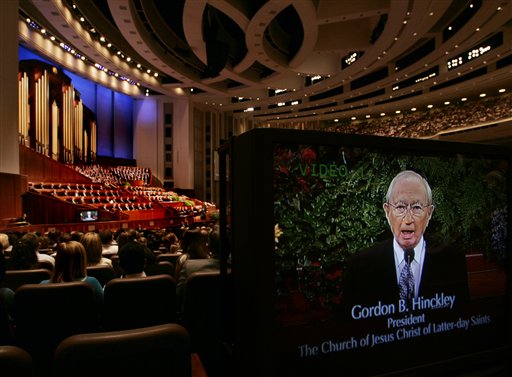 "Now
we are at war. Great forces have been mobilized and will
continue to be. Political alliances are being forged. We
do not know how long this conflict will last. We do not
know what it will cost in lives and treasure. We do not
know the manner in which it will be carried out. It could
impact the work of the Church in various ways." "Now
we are at war. Great forces have been mobilized and will
continue to be. Political alliances are being forged. We
do not know how long this conflict will last. We do not
know what it will cost in lives and treasure. We do not
know the manner in which it will be carried out. It could
impact the work of the Church in various ways."
"No one knows how long it will last. No one knows precisely
where it will be fought. No one knows what it may entail
before it is over. We have launched an undertaking the size
and nature of which we cannot see at this time."
"I do not know what the future holds. I do not wish
to sound negative, but I wish to remind you of the warnings
of scripture and the teachings of the prophets which we
have had constantly before us."
"Now, I do not wish to be an alarmist. I do not wish
to be a prophet of doom. I am optimistic. I do not believe
the time is here when an all-consuming calamity will overtake
us. I earnestly pray that it may not." There is so much
of the Lord’s work yet to be done. We, and our children
after us, must do it. I can assure you that we who are responsible
for the management of the affairs of the Church will be
prudent and careful as we have tried to be in the past.
The tithes of the Church are sacred."
"How grateful I am for the law of tithing. It is the Lord’s
law of finance. It is set forth in a few words in the 119th
section of the Doctrine and Covenants. It comes of His wisdom.
To every man and woman, to every boy and girl, to every
child in this Church who pays an honest tithing, be it large
or small, I express gratitude for the faith that is in your
hearts. I remind you, and those who do not pay tithing
but who should, that the Lord has promised marvelous blessings
(see Mal. 3:10-12). He has also promised that “he that is
tithed shall not be burned at his coming” (D&C 64:23)."
"Now, brothers and sisters, we must do our duty, whatever
that duty might be. Peace may be denied for a season.
Some of our liberties may be curtailed. We may be inconvenienced.
We may even be called on to suffer in one way or another.
But God our Eternal Father will watch over this nation and
all of the civilized world who look to Him. He has declared,
“Blessed is the nation whose God is the Lord” (Ps. 33:12).
Our safety lies in repentance. Our strength comes of
obedience to the commandments of God."
- Gordon B. Hinckley, “The Times in Which We Live,” October
2001 General Conference (Ensign, Nov. 2001, Page 72)
2. Nature of God
In a January 2002 interview, Hinckley was asked to characterize
God's connubial relationship. With prophetic power he could
have explained:
"Brigham Young was a great prophet of the Lord who received
many revelations pertaining to the salvation of mankind,
as have many other church prophets. We know through modern
revelation that there is eternal progression and worlds
without number for those who live worthily. As you learn
more about the gospel, you come to a true understanding
of the nature of God and what eternal progression means."
Instead, this is what he actually said:
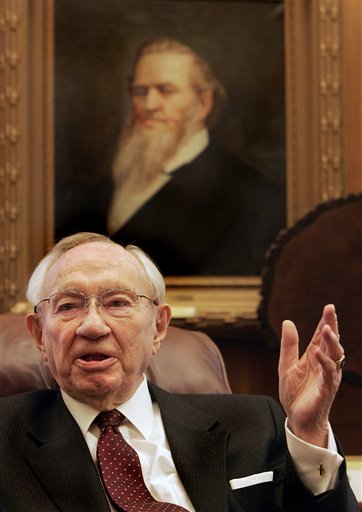 "Brigham
Young said if you went to Heaven and saw God it would be
Adam and Eve. I don't know what he meant by that."
Pointing to a grim-faced portrait of the Lion of the Lord,
as Young was called, Hinckley said, "There he is, right
there. I'm not going to worry about what he said about those
things." I asked whether Mormon theology was a form of polytheism.
"I don't have the remotest idea what you mean," Hinckley
said impatiently. "Brigham
Young said if you went to Heaven and saw God it would be
Adam and Eve. I don't know what he meant by that."
Pointing to a grim-faced portrait of the Lion of the Lord,
as Young was called, Hinckley said, "There he is, right
there. I'm not going to worry about what he said about those
things." I asked whether Mormon theology was a form of polytheism.
"I don't have the remotest idea what you mean," Hinckley
said impatiently.
- Hinckley Interview in "Lives of the Saint", New Yorker,
January 2002 http://www.newyorker.com/PRINTABLE/?fact/020121fa_FACT1
3. The Celestial Kingdom
When a young woman in the church wrote Hinckley and asked
him if women can go to the Celstial Kingdom without a man,
Hinckley answered her question from the tabernacle puplit.
Here's what he should have said if he were a true prophet:
"Beyond the wonderful and descriptive words found in sections
76 and 137, the Lord has revealed to me that yes, righteous
women, as well as righteous men, will receive full blessings
and fellowship in that kingdom. I know this question troubles
many worthy sisters in the church who, for whatever reason,
have experienced divorce. Some in the church may be confused
and incorrectly think that women cannot enter the Celestial
Kingdom without a man. But let me make it clear that the
Lord loves righteous single women as much as righteous married
women and their relationship with the Lord is not diminished
by the absence of a husband.
This is what Hinckley actually said:
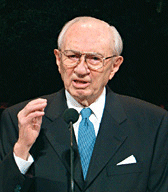 "Beyond
the wonderful and descriptive words found in sections 76
and 137 [D&C 76; D&C 137] we know relatively little concerning
the celestial kingdom and those who will be there. At
least some of the rules of eligibility for acceptance
into that kingdom are clearly set forth, but other than
that, we are given little understanding." "Beyond
the wonderful and descriptive words found in sections 76
and 137 [D&C 76; D&C 137] we know relatively little concerning
the celestial kingdom and those who will be there. At
least some of the rules of eligibility for acceptance
into that kingdom are clearly set forth, but other than
that, we are given little understanding."
- Gordon B. Hinckley, “Daughters of God,” Ensign, Nov.
1991, Page 97:
4. Why Eve Was Created From Adam and Why Adam should
Rule Over Eve.
When asked this question, Hinckley as a prophet could have
said:
"The next question you ask is why Eve was created from Adam.
I can understand why this part of the Genesis narrative
could be interpreted as a evidence that Man is superior
to women. But nothing could be further from the truth. As
I have prayed and pondered over your sincere question, I
have learned from the Lord that as an all-wise Creator he
did not in fact create Eve in this way, nor did he command
Adam to rule over Eve. These parts of the story of Adam
and Eve are not doctrinal."
"You ask whether men are more important than women. Let
me assure you that that notion is also false doctrine and
has no part in the Gospel of Jesus Christ."
This is what Hinckley actually said:
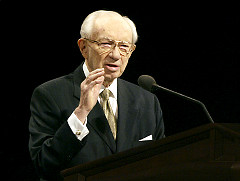 "The
next question you ask is why Eve was created from Adam.
I can only respond that an all-wise Creator did it that
way.... Now, Virginia, you call attention to the statement
in the scriptures that Adam should rule over Eve. (See Gen.
3:16.) You ask why this is so. I do not know." "The
next question you ask is why Eve was created from Adam.
I can only respond that an all-wise Creator did it that
way.... Now, Virginia, you call attention to the statement
in the scriptures that Adam should rule over Eve. (See Gen.
3:16.) You ask why this is so. I do not know."
"You ask whether men are more important than women. I
am going to turn that question back to you. Would any
of us be here, either men or women, without the other?"
- Gordon B. Hinckley, “Daughters of God,” Ensign, Nov.
1991, Page 97:
5. Doctrine that God Was Once Man
When asked if the church believes that God the Father was
once a man like we are, Hinckley should have said:
"One of the great blessings of this church is that we have
the fullness of the gospel and through modern revelation
know the true nature of God and the purpose of life. The
prophet of the restoration, Joseph Smith revealed that 'God
himself was once as we are now, and is an exalted Man, and
sits enthroned in yonder heavens.' The Prophet Smith declared
that 'That is the great secret... It is the first principle
of the Gospel to know for a certainty the character of God
and to know...that he was once a man like us.... Here, then,
is eternal life - to know the only wise and true God; and
you have got to learn how to be Gods yourselves,... the
same as all Gods have done before you...' (Journal of Discourses
6:3-4, also in Teachings of the Prophet Joseph Smith, 342-345)
That revelation has been sustained many times by other leaders
of this church, as I sustain it today."
Hinckley actually said:
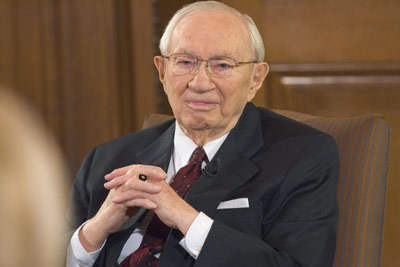 "I
don't know that we teach it. I don't know that we emphasize
it. I haven't heard it discussed for a long time in
public discourse. I don't know. I don't know all the
circumstances under which that statement was made. I
understand the philosophical background behind it. But
I don't know a lot about it and I don't know that others
know a lot about it." "I
don't know that we teach it. I don't know that we emphasize
it. I haven't heard it discussed for a long time in
public discourse. I don't know. I don't know all the
circumstances under which that statement was made. I
understand the philosophical background behind it. But
I don't know a lot about it and I don't know that others
know a lot about it."
- Interviewing Gordon B. Hinckley, Time Magazine, Aug
4, 1997 http://home.teleport.com/~packham/gbh-god.htm
6. Blacks and the Priesthood
In a January 2002 interview, Hinckley was asked: "Until
1978 no person of color attained the priesthood in your
church. Why it took so long time to overcome the racism?"
If Hinckley was a real prophet, he could have answered:
"We are under the dictates of our Heavenly Father, and it
was not my policy or the Church's policy. It was the policy
of the Lord who established it. We are subject to revelations
of the Lord in cases when he wishes to make changes. The
Lord had his reasons, which were revealed by the prophets
alive during the time of the priesthood ban on blacks. But
as we are blessed with on-going revelations from the Lord,
that is all behind us know."
Instead, this is what Hinckley actually said:
"I don’t know. I don’t know. I can only say that. (long
pause) But it’s here now."
- Gordon B. Hinckley Interview – ZDF German Television,
Salt Lake City, Utah January 29, 2002.
7. Tattoos and Body Piercing
Here's what a real prophet should have said:
"I can understand why some young men and women would be
tempted to follow recent fashion trends of body piercing
and tattoos. Each generation of youth struggles with the
desire for acceptance and feelings of rebellion. Many parents
have asked church leaders to speak out against tattoos and
body piercing. However, the spirit of the Lord reminds us
of the wisdom of the Prophet Joseph Smith when faced with
a similar issue. The Prophet was once asked by a visitor
to the city of Nauvoo how it was that he governed so many
people who lived in such peace and prosperity. The Prophet
said, “I teach them correct principles and they govern themselves”
(Journal of Discourses, 10:57-58)."
"This same advice would apply to the changing fads and fashions
of the world. It is neither possible nor proper for Church
leaders to comment on how members should react to every
fad that comes along. We know from the teachings of Jesus
Christ that the body is a temple at that we should strive
to keep it holy. No more church direction need be given."
"However, there is a larger issue involved in the question
of bodily adornment that we as Latter-Day Saints must consider.
The Lord has taught us that his true disciples should not
judge others too harshly, especially in matters of outward
appearances. I am reminded of the great council the Lord
gave Samuel when He said, "Look not on his countenance,
or on the height of his stature; because I have refused
him: for the LORD seeth not as man seeth; for man looketh
on the outward appearance, but the LORD looketh on the heart."
(1 Sam. 16: 7)"
"This simple scripture contains much wisdom. It reminds
us that outward appearances can be deceiving. It also tells
us that if we can look past the tattoos or earrings that
many a youth bear on the outside, we may find great hearts
willing to do good."
"How sorrowful the Lord must feel when we are fooled by
appearances and reject good people who could benefit from
our loving fellowship and His gospel."
But instead, this is what Hinckley actually said:
 "I cannot understand why any young man—or young woman, for
that matter—would wish to undergo the painful process of
disfiguring the skin with various multicolored representations
of people, animals, and various symbols... Fathers, caution
your sons against having their bodies tattooed. They may
resist your talk now, but the time will come when they will
thank you. A tattoo is graffiti on the temple of the body."
"I cannot understand why any young man—or young woman, for
that matter—would wish to undergo the painful process of
disfiguring the skin with various multicolored representations
of people, animals, and various symbols... Fathers, caution
your sons against having their bodies tattooed. They may
resist your talk now, but the time will come when they will
thank you. A tattoo is graffiti on the temple of the body."
"I submit that it is an uncomely thing, and yet a common
thing, to see young men with ears pierced for earrings,
not for one pair only, but for several. They have no
respect for their appearance. Do they think it clever or
attractive to so adorn themselves? I submit it is not
adornment. It is making ugly that which was attractive.
Not only are ears pierced, but other parts of the body as
well.. It is absurd."
"May I mention earrings and rings placed in other parts
of the body. These are not manly. They are not attractive.
You young men look better without them... As for the
young women, you do not need to drape rings up and down
your ears. One modest pair of earrings is sufficient."
- Gordon B. Hinckley, “Your Greatest Challenge, Mother,”
Ensign, Nov. 2000, 97 and text of a talk given to youth
and young single adults on 12 November 2000 at the Conference
Center in Salt Lake City and broadcast by satellite throughout
the Church.
|